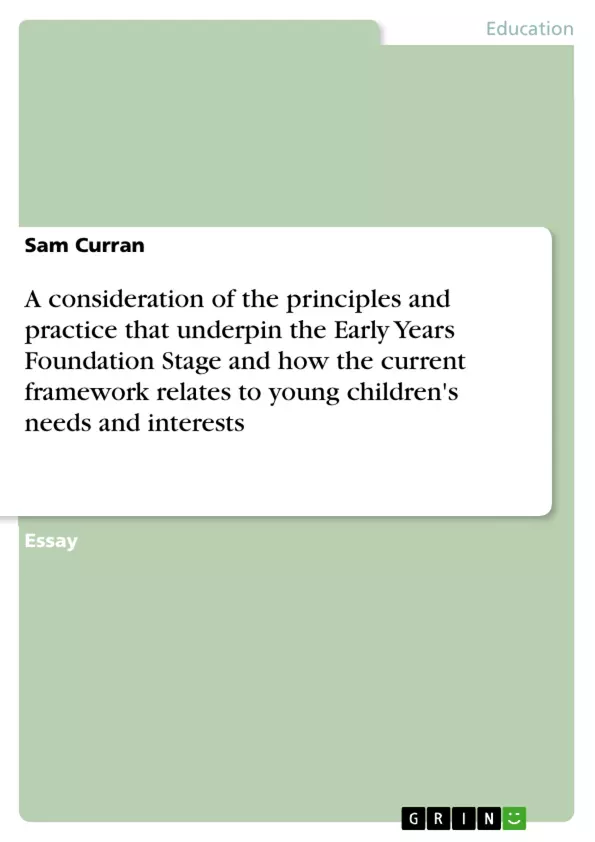The Departmnt for Education enunciates that the Early Years Foundation Stage (EYFS) is a set of statutory guidelines which all childcare providers (including schools, nurseries and children’s centres) must adhere to in catering for children between the ages of 0 to 5, upon which time they will enter full-time education. The EYFS has been in circulation for several years, undergoing numerous revisions and amendments. The most recent version was published in September 2014 and is a simplified version of past documents, by having four overarching principles which is guided upon: every child is unique, children become strong through building positive relationships, children learn and develop well in ‘enabling environments’ and finally that children develop and learn at different rates. These 4 areas will provide the structure for this assignment. The EYFS seems to comprehensively cover all the needs which children may have in their formative years. It is also concurrent with previous initiatives the government have devised, such as SEAL (Social and Emotional Aspects of Learning), which implored teachers and practitioners to adopt a holistic stance in educating their pupils and Every Child Matters, which stressed that each child was an individual and should be treated as so.
Inhaltsverzeichnis (Table of Contents)
- Introduction
- Principle 1- Every Child is Unique
- Principle 2- Children become strong and independent through positive relationships
- Principle 3- Children learn and develop well in ‘enabling' environments
- Principle 4- Children develop and learn in different ways and rates
- Conclusion
Zielsetzung und Themenschwerpunkte (Objectives and Key Themes)
This document aims to analyze the principles and practices underlying the Early Years Foundation Stage (EYFS) framework. It examines how the current EYFS framework relates to the needs and interests of young children, focusing on the four overarching principles that guide the framework.
- The significance of recognizing each child as an individual with unique needs and learning styles.
- The role of positive relationships in fostering children's independence and development.
- The importance of providing enabling environments that stimulate children's exploration and learning.
- The recognition that children develop and learn at different rates and through diverse approaches.
Zusammenfassung der Kapitel (Chapter Summaries)
- Introduction: This chapter introduces the EYFS framework and its statutory guidelines for childcare providers, highlighting its evolution and the four overarching principles that underpin its structure.
- Principle 1- Every Child is Unique: This chapter explores the theoretical underpinnings of the principle of individualizing care and learning, drawing upon the work of prominent theorists such as Bandura and Piaget. It discusses the importance of treating children as individuals with unique learning journeys.
- Principle 2- Children become strong and independent through positive relationships: This chapter examines the role of positive relationships, particularly with key workers, in fostering children's independence and development. It delves into the theoretical perspectives of Piaget, Vygotsky, and Bandura, highlighting the importance of guided participation and modeling desirable behaviors. The chapter also considers the role of attachment theory and the transition from parental care to childcare settings.
- Principle 3- Children learn and develop well in ‘enabling' environments: This chapter focuses on the concept of enabling environments that stimulate children's exploration and learning. It draws upon Piaget's theory of children's natural inquisitiveness and the role of key workers in creating such environments. The chapter discusses the importance of providing diverse learning opportunities, including play-based learning, outdoor and indoor activities, and heuristic learning approaches.
Schlüsselwörter (Keywords)
The document focuses on the Early Years Foundation Stage (EYFS), its principles and practices, and its application in the context of early childhood education. Key themes include individualizing care, positive relationships, enabling environments, child development, learning styles, and the role of key workers in supporting children's growth and learning.
Frequently Asked Questions
What is the Early Years Foundation Stage (EYFS)?
EYFS is a set of statutory guidelines in the UK that all childcare providers must follow for children from birth to age 5.
What are the four overarching principles of EYFS?
The principles are: Every child is unique, positive relationships, enabling environments, and learning and development at different rates.
Why are "enabling environments" important?
Enabling environments stimulate a child's natural inquisitiveness and provide diverse opportunities for play-based and heuristic learning.
What is the role of a "key worker" in EYFS?
A key worker builds a positive relationship with the child, fostering independence and acting as a bridge between parental care and the childcare setting.
How do Piaget and Vygotsky relate to EYFS?
Their theories on cognitive development and social learning (like guided participation) underpin the EYFS focus on individual learning journeys and adult-child interaction.
- Arbeit zitieren
- Secondary Mathematics Teaching Sam Curran (Autor:in), 2014, A consideration of the principles and practice that underpin the Early Years Foundation Stage and how the current framework relates to young children's needs and interests, München, GRIN Verlag, https://www.grin.com/document/448785



